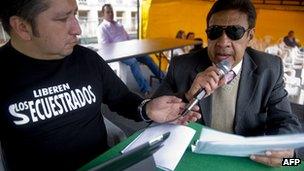Colombia Farc rebels vow to free hostages
- Published

Relatives of the kidnapped took part in a 110-hour radio marathon this week demanding their release
Colombia's left-wing Farc rebel group says it will free 10 members of the security forces it holds hostage and abandon kidnappings for ransom.
The move comes three months after the Farc killed four hostages they had held for more than 12 years, which prompted massive protests against the rebels throughout Colombia.
The Farc did not say whether they would free the civilians it holds captive.
The group finances itself through kidnappings and drug trafficking.
In a statement released on a website, the Farc Secretariat, the rebel group's highest body, said that it would free the remaining 10 "political prisoners" in its power.
The group had already announced last year that it would free five policemen and one soldier, but then called off the release, blaming increased military activity in the area for its change of heart.
In its statement, the Secretariat said it would add another four hostages to the planned release.
It also revoked what it calls its Law 002, in which it had sanctioned kidnappings for ransom.
"Much has been said about the kidnapping of civilians for financial goals, which we, the Farc carry out to finance our struggle," the statement reads.
"We're announcing that from now the practice will cease and that said part of Law 002...has therefore been repealed," the statement continues.
'Important step'
All 10 hostages are members of Colombia's security forces, most of whom have been held for more than a decade.
The rebels also announced they were "banning the practice of kidnapping for ransom from our revolutionary practices".
Colombian President Juan Manuel Santos welcomed the announcement in a tweet, calling it "an important step", but said it was "not sufficient".
Mr Santos has in the past said there can be no peace talks with the rebels until they release all their captives, stop their attacks, refrain from recruiting minors and cease to traffic drugs.
The BBC's Jeremy McDermott in Colombia says the Farc's statement constitutes a significant concession.
Our correspondent says that while customarily belligerent in tone, the statement is revolutionary in its implications as it puts an end to the Farc's long-held policy of kidnappings for ransom.
Wave of protest
The number of civilians held hostage by the rebels is not clear.
Fondelibertad, a department attached to the defence ministry and responsible for co-ordinating anti-kidnapping efforts, says fewer than 100 people are currently in captivity.
These figures have been disputed by non-governmental organisations, which believe the number is much higher.
Earlier this week, relatives of the kidnapped took part in a 110-hour marathon radio programme demanding the release of their loved ones, all of whom have been held for more than 12 years.
In December, tens of thousands of Colombians took part in rallies across the country demanding an end to kidnappings.
The protests were called after three policemen and a soldier were killed by the Farc as troops approached the camp where they were being held.
The Colombian government has negotiated with the rebels in the past.
In 1999, the authorities agreed to hand the Farc a 42,000-sq-km (26,000-sq-mile) safe haven, which many analysts argued was a strategic mistake as the rebels used the area to regroup and train, making it a stronger enemy once the talks broke down.
- Published24 February 2012
- Published27 May 2013
- Published17 February 2011
- Published29 August 2013